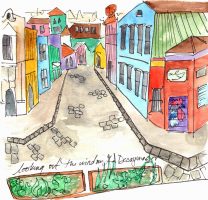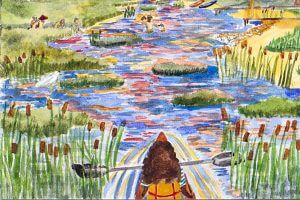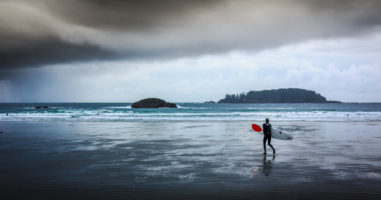Support Hidden Compass
Our articles are crafted by humans (not generative AI). Support Team Human with a contribution!
This was a forest in transition: the air chilled but the yellow-white sun was warm. With each step, my cheeks grew more flushed, and the cold receded — a premonition of spring’s arrival. Yolk-yellow pollen freckled their bark, but the trees were still spare, brown and gray and twisting. Without a canopy of leaves to interfere, my gaze sliced straight through the empty forest, absorbing the 10 miles of the Appalachian Trail I was day hiking. I was north of my home in Atlanta, enshrined in the safety of the trees, but I still had so much farther to go.
Pushing my legs up and over an incline of gray stone, I practiced my breaths: in through the nose, out through the mouth, slowing my pace accordingly. Only two months ago, I’d never hiked more than five miles. Now, I was just a month away from the four-day, 50-mile W Trek in Torres del Paine National Park in Chilean Patagonia. My breaths quickened. I still wasn’t sure I could hike 50 miles, but I had a love for wild things and a desperate need to believe the world was beautiful again.
The very end of the world — a place where either I would conquer my fears or they would conquer me.
In through the nose, out through the mouth. The barren forest stretched, a creature awakening, and a familiar helplessness wrapped around me.
My unease multiplied as my gaze darted in every direction, looking for a danger that refused to materialize, anxiety clawing my chest. Dread stalked me through the forest, winding its way through the trunks. My whole body ached with awareness, the absolute certainty of catastrophe. Above me, the trees grew taller — the sky disappearing. The wind whispered; I was never getting out of this forest. The trees rustled. I gritted my teeth. Sometimes, the trees felt gentle, as if they might reach down and embrace me. Often, it felt as if they might extend their withered fingers and choke the remaining life from me. I cannot do this.
No matter how strong I became, how many miles I hiked, I felt weak. Every step was doomed to fail as I struggled against the confines of post-traumatic stress disorder (PTSD).
In the quiet of winter forests, I’d discovered how quickly exercise could transition into a panic attack. How the increased heart rate, blood pressure, and respiration mimic the experience of unending terror. PTSD is a disorder of fear, but it’s also a disorder of time. The amygdala — the tiny area of the brain responsible for fight-or-flight — can’t differentiate between past and present threats. I wasn’t here; I was there. I was always there. Or it was here. It was everywhere. All around me, invading my lungs and burrowing into my bones. I wondered if even a plane ride to Patagonia would allow me to escape it.
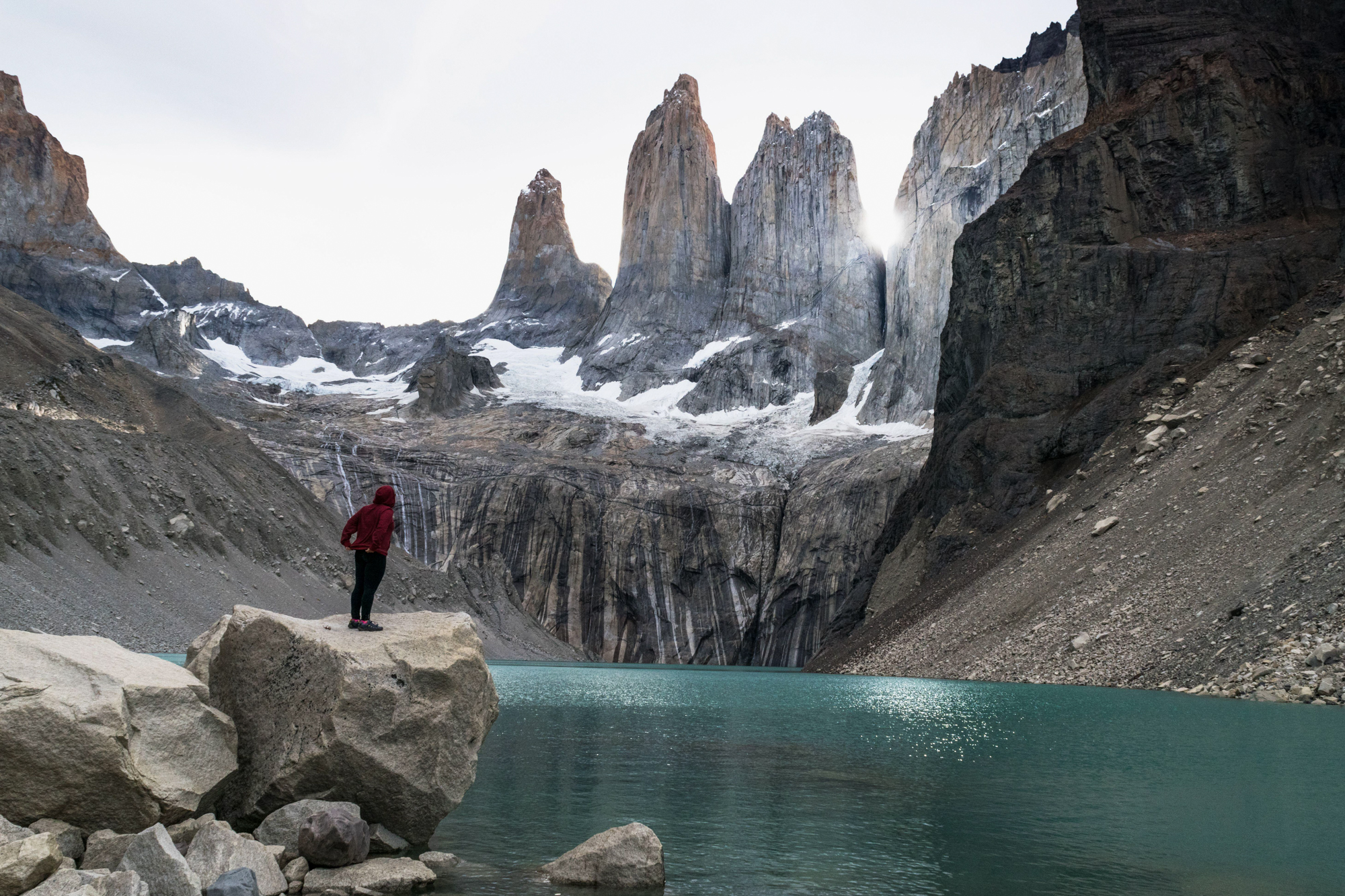
The “towers” at Mirador Base are the namesake for Patagonia’s Torres Del Paine National Park. Photo: Juan Napurí / Alamy.
~~
It is undeniably, unbearably dark when I wake up, the air still as only the air in a hotel room can be. My father’s quick, gusting breaths cut through the darkness, followed by deep snores and the distended silence in between. It is a quiet that lingers. A quiet that envelops me in fear.
Wake up, Dad. Wake up.
I peel the heavy curtain away from the windows, but only the weak, gray light before dawn reaches us, the sun still tucked behind the Montana mountains.
Wake up, Dad. His skin is soft where I shake his shoulder. His brow is furrowed, his face mottled pink. Wake up.
With each light I turn on, my volume and tempo increase. WAKE UP! My breaths grow quicker as his grow further apart. WAKE UP!
The whole room is bright now. My fingers are wet with the water I’ve thrown onto his face. My screams fill the room. His chest sits waiting, unmoving. I can’t fathom that stillness.
My fingers are numb as I frantically dial 911. I open the door just as the call clicks to connect, but immediately my hope crashes down around me. There’s just nothing, no one on the other end of the line — like I’m the only thing left in this world.
I chase my shouts as they echo down the hallway, rough carpet burning my bare feet. Doors blur by as I plead for a response. At the end of the hallway, a voice finally breaks through.
“What’s going on?”
“He won’t wake up.”
“Ma’am, is he breathing?”
“No.”
I’m in the lobby now, other guests still like statues.
“Ma’am, you need to do CPR.”
“No, I don’t know how.”
“Ma’am, you have to do CPR.”
I don’t think I can do that.
The statues come to life; they’re running back up the stairs, down the hall with me, the voice on the phone shouting until the line cuts out again.
Then, there are medical kits and police officers and paramedics. There is the violence of his chest bowing off the ground with each electric charge. There is a growing distance between me and the action in the room — a tunneling away from that moment, from my body. I had been a person before, but now, I am something else.
The police pull what is left of me away, back down the hallway, back down to the lobby. My eyes are open, but there is a stretcher I never see as I shift from the lobby to the passenger seat of the ambulance.
Someone buckles the seatbelt over my pajamas. The sirens are far away. The sun will never rise. I look out the window, my dark reflection flashing red and white.
Clouds hang low in bruised purples and blues above the shadowed mountains. The emergency room is quiet, white and cold like snow.
I sit in the ICU, its machines beeping, a ventilator whirring. I sit there for a week, until it grows silent. Then I fly home, alone.
~~
The first morning of the W Trek, I woke early to plait my bronze curls into two French braids. A cold breeze blew in through the window of the campsite bathroom and coaxed the pink from my skin. I liked that it was autumn here. At home, it was spring. It had been autumn when I’d last seen my father; it should be autumn forever.
In the mirror, lit by unforgiving predawn light, I saw an older version of myself. It had been seven months since I saw my reflection in the ambulance window, but my eyes still looked wide and frightened. Thin fault lines carved the hollow skin beneath them.
My gaze fell away from the specter in the mirror. I didn’t want to be afraid anymore. After stalling for months in talk therapy, I needed a different way to confront my trauma, something that could dredge the rot festering inside me. I didn’t want to do another worksheet appealing to my sense of reason. I wanted to feel the ground beneath my feet and see myself in the water and wind.
I didn’t know it yet, but that is the somatic model of trauma recovery: the idea that experiences that challenge helplessness and fear can heal the body and mind. I also didn’t know aerobic exercise can improve PTSD symptoms by cultivating feelings of accomplishment and capability. I just knew that I craved those feelings. I knew I’d once been a person who reveled in travel and adventure, who flew to Montana with her father to explore Glacier National Park but never got the chance. I wanted to be that person again. I hoped that if I could hike these 50 miles, I could go home and find a path forward. I knew it was what he would want, too.
Yet in three months of training, I’d never escaped my panic and fear. How could I complete this hike, let alone conceive of a future, when my racing heart always returned me to that hotel room? I didn’t know. I didn’t know, but I was here to find out. I have to do this. I shrugged on my father’s worn, navy rain jacket, slightly too big on my shoulders, and walked outside to find my group.
~~
Perched high above the park’s many turquoise lakes, the first section of the trail undulated in gentle peaks and dips. Our guide, Diego, set a steady pace for our group of six, and my fear eased each time my lungs expanded. The air was richly oxygenated from the lichens that clothed the land. They provided a continuous green against the crimson and gold of the changing season. I felt anchored to the earth even as the rocks beneath our feet shifted, creating a pat-pat-patter to accompany the rise and fall of our voices as we delved into this wilderness we’d inhabit for the next four days.
Our group quickly found a comfortable rhythm. Sometimes we listened to the rustling of the earth. Sometimes we screamed against the roaring wind: “I can’t believe how beautiful this is! I can’t believe this is real!” There was an electricity in the air, a beauty and aliveness I coveted. Gazing out across the lakes and mountains, I saw a glimpse of the future. It carried me forward.
I had a love for wild things and a desperate need to believe the world was beautiful again.
As the miles accumulated, the distance between our group began to lengthen. I found myself alone, navigating across glacial streams and along exposed ridges. Above me, hanging glaciers cloaked mountain peaks in shades of glassy blue. The scale was unfathomable.
When all I could hear was the rushing of the wind and the beating of my own heart, my pride dissipated. Helplessness had stalked me here, to the very end of the world.
My amygdala sparked with alarm. This was my hypervigilance. Above, the mountains loomed as I fell into their shadow. My backpack grew unbearably heavy; the weight was dragging me down. The world — dizzy and disembodied. The air no longer felt rich and clear. Its frozen fingers squeezed my throat.
Why can’t I just grieve?
Seven months later, I was still plagued by nightmares, my father’s death playing on repeat. Each night, I slept with a lamp on because the darkness suffocated me. Each morning, my racing heart woke me and colored my day with dread. That was why I’d come to Patagonia — to purge those feelings with blood and sweat and tears.
But I could feel the sweat and tears mixing on my cheeks, and I still didn’t know peace. My thoughts cycled in time with the beat of trekking poles against soft soil.
I cannot do this.
I have to do this.
I cannot do this.
I have to do this.
~~
As I pulled wool socks over my blistered feet the following morning, Diego explained to our bleary-eyed group that this section of the trail would be the hardest. We’d hike 15 miles up and down steep, unstable terrain through harsh winds and dense forest before reaching our next campsite.
If we didn’t think we could handle that, we could hike the four relatively flat miles directly to the camp alone. But if we followed him toward the hanging glacier, in an area so inaccessible there would be no hope of boat or helicopter rescue were we to get injured, there would be no turning around. Familiar panic hummed beneath my skin. I knew what it was like for a 911 call not to connect.
There’s just nothing, no one on the other end of the line — like I’m the only thing left in this world.
As we set off into the dense brush, I half-heartedly listened to Diego’s enthusiastic explanations of the area’s ecological history, the wildfires that had devastated this portion of the park and the new growth that sprung up in the aftermath. I felt an undeniable kinship with this soil that knew both life and death, but my attention was on the miles we’d hike. I was afraid to show my panic. I focused on my breaths — in through the nose, out through the mouth — and kept my eyes on my hiking boots.
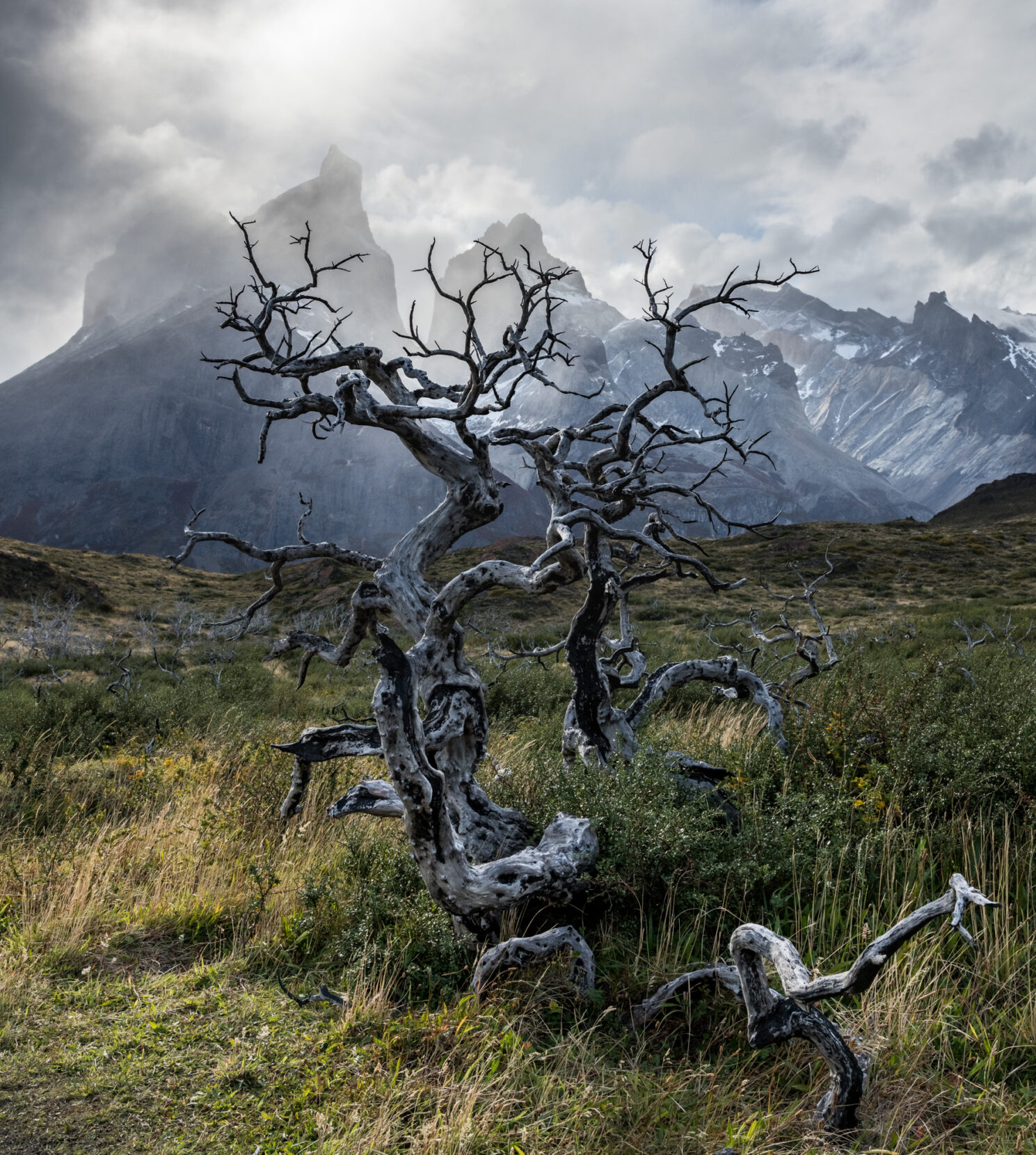
Burnt trees haunt the landscape along one of Patagonia’s hiking trails. Photo: Sivani Babu.
After a mile, the ashy foliage disappeared, and we found ourselves in a field. To my right, I saw several cerulean lakes. The sky was a lighter blue with wispy clouds and a double rainbow arching above us. We laughed like children at the sight of the rainbow. I wanted this moment of laughter and beauty to last, for nothing to be hard ever again. But soon, Diego pointed to the distant mountain peaks to our left.
“See that gray, rocky area past the treeline? It’s where a glacier has receded. That’s where we’ll be hiking up to.”
I swallowed another gulp of water, and my mouth filled with the saccharine taste of fruit punch-flavored electrolyte powder. This was the crossroads, where I could choose to hike the four miles to our next campsite alone or follow Diego up into the mountains. I looked toward where he indicated. It seemed inconceivably far away.
~~
I so desperately wanted to skip this grueling section of the trail, but I also wanted to feel powerful, to be someone who climbed mountains. I could understand the concept of learned helplessness viscerally now — why past feelings of powerlessness predispose you to future inaction. It feeds off the belief that you’re just an observer, unable to influence your life or the world around you.
Yet each time I tried to confront my helplessness, panic flooded my body, a remembrance of silent phone lines and helpless hands. Even as I chose to follow our group toward the forest, panic beat against my chest. I cannot do this.
My skin grew salty with sweat as I struggled to keep up with the group. I wished I could tell them about this burden slowing me, but shame bound my fear. With each heaving step, my ankles rocked, stones constantly shifting beneath my feet as we pushed ourselves up and up.
We switched back and forth between shaded forest — the leaves falling in burgundies and browns — and tumbling paths of boulders as we moved toward the icy blue of the hanging glacier. Sometimes the air would rumble with the sound of faraway avalanches.
Dread stalked me through the forest, winding its way through the trunks.
As we ascended, Diego began a morose monologue on the realities of this beautiful, wild place. “There,” he said, pointing to a relatively inconspicuous spot on the trail, “a tourist was blown off the path by high winds and fell to his death.”
The winds here did indeed feel like they might decide to pick me up and take me away with them. They were biblical, gusting through the exposed areas of the trail and pulling the moisture from my skin.
“Do people die here a lot?” I tried to squeeze my body as far away from the cliffside as possible. My vision buzzed from dehydration.
“Oh yes.” Diego’s dreads swished like cat tails as he continued forward without fear. “They fall. They have heart attacks. They die of exposure. That’s life,” he shrugged. “People die.”
As we continued upward, Diego’s words took root. When we broke through the treeline, the winds grew more fierce, shrieking past us. I could finally see the glacier; it clung to the mountainside above us. Awe mingled with my sorrow. The glacier felt eternal in a way I was not, yet as I watched, a tiny section broke away, the dusty avalanche disappearing into the gorge below.
My normal world had not seemed like a place death could visit. That belief had betrayed me. Here, I was reminded that I could return to the earth at any moment. This place of avalanches and tempests mirrored my broken heart.
It was honest.
~~
When I woke for our third day of hiking, my body felt wrecked with bone-deep weariness. My feet throbbed where patches of skin had disappeared with the relentless friction of walking. My lips burned where the sun and wind had stripped their moisture. We only needed to hike a relatively short seven miles toward the massive Grey Glacier, but I still couldn’t shake the fear that I wouldn’t make it. I should have felt buoyed by the fact that I’d already completed half of the 50-mile trek, but even now, even here, I couldn’t remove that veil of hopelessness.
The morning light was soft. The sun stayed low in the sky this far from the equator. In the shadows, my steps grew heavy with anticipatory defeat. Soon, I couldn’t see the rest of our group where the trail twisted and turned. Only Diego walked beside me now, his patience furnishing the silence between us.
~~
I couldn’t comprehend what it meant to be a daughter in the absence of a father. For 23 years, my dad had instilled the belief that I could do anything, take every risk because of his support, his unfaltering pride and faith in me. When I decided to do a semester abroad 9,000 miles from home, he flew with me to New Zealand. A skydiver and pilot in his youth, he cultivated my confidence to travel the world alone, to swim with sharks in the Great Barrier Reef and dive into sea caves in Fiji.
I didn’t feel tethered to that person anymore. In Montana, I went to sleep thinking we were beginning another grand adventure and woke to realize I’d lost decades with him. When I flew home alone, I left behind who I’d been and what I believed about the world.
Later, I began to research the profound disruptions caused by trauma and grief — how they dismantle our self-concept and worldview. Our identities don’t evolve in isolation; we develop merged identities with those, like parents, whose daily reality and future plans connect closely to our own. These people become central to our sense of self, and their loss fractures us. Until we can accommodate the reality of their loss into our identity, the fragmentation and grief remain.
I had been a person before, but now, I am something else.
I struggled to confront that new reality because the traumatic circumstances had shattered my sense of safety, too, but the idea of Patagonia, bolstered by each training hike on my way here, formed fissures in my sense of helplessness. I harbored a secret hope that if I could complete this hike, maybe I could recover my sense of possibility.
That is the fragile, complex promise of post-traumatic growth: that the same devastation that had destroyed me could yield the possibility of a new worldview with space for both beauty and tragedy. The responsibility was heavy, yet I’d felt hope begin to bloom — gazing out across the park on the first morning of the hike, at the rainbows curving through the sky, at the sprouts where wildfires had scorched the earth.
I have to do this.
~~
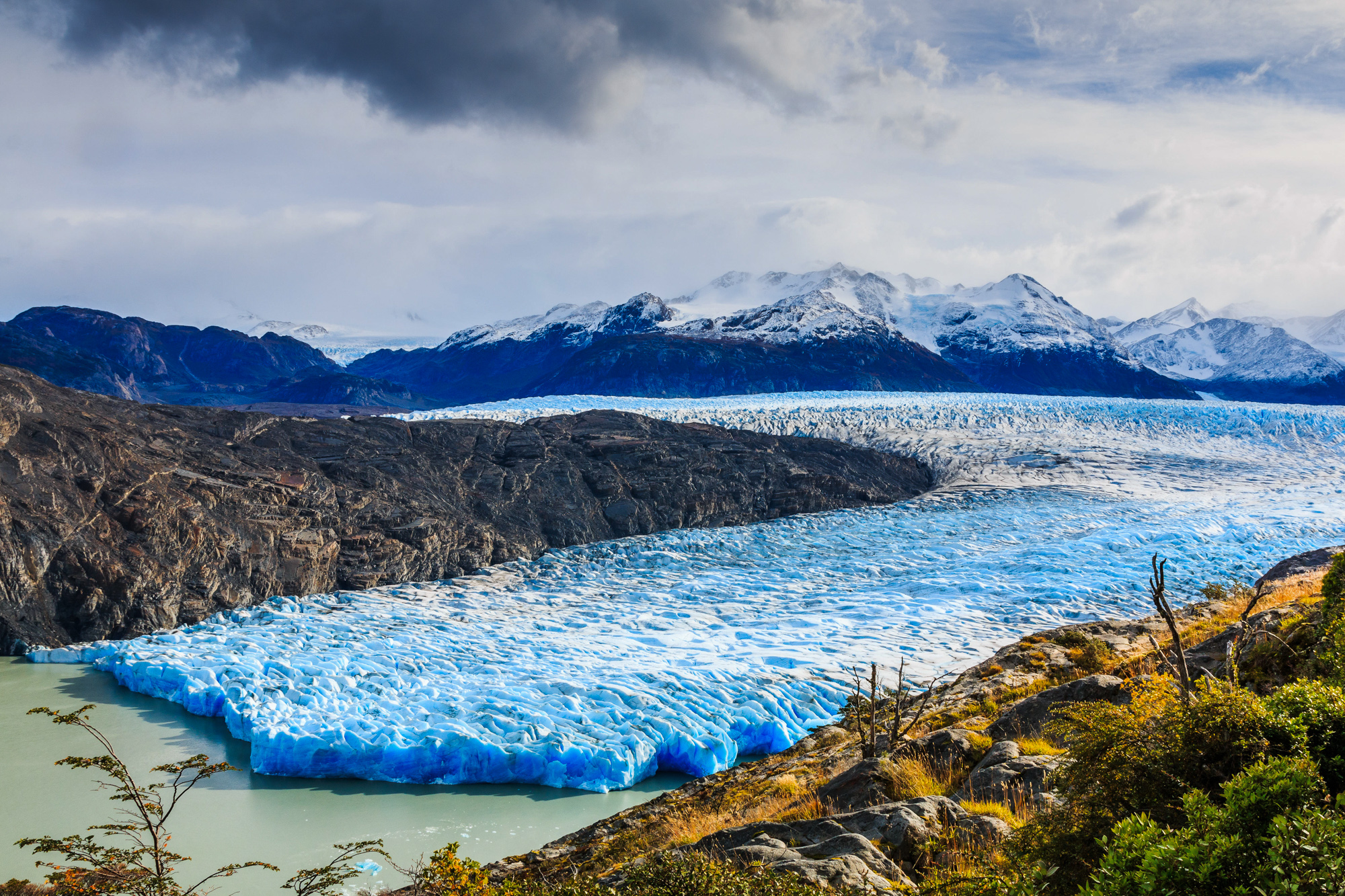
The Grey Glacier in Torres Del Paine National Park, Chile is about six kilometers across and averages 30 meters high. Photo: Carmen Gabriela Filip / Alamy.
Halfway to our next campsite, Diego and I caught up with our group and stopped at an overlook to rest. Across the deep-azure water, the mountains parted to reveal our first glimpse of Grey Glacier. It was a surreal, translucent pale blue. Collapsing onto the cool surface of a boulder, I pulled off my hiking boots and socks to inspect my growing blisters. They’d begun to merge like some sort of supercontinent, their bite joining the aching cold as it gnawed on my bare skin. Diego sat next to me with his first aid kit and began to wrap my toes carefully with moleskin.
“I wanted to prove I could do something hard,” I confided, wiggling my toes as I stared down at my feet. “My dad died seven months ago. That’s why I came here.”
“You did do something hard,” Diego’s voice lacked the pity I had grown accustomed to. He smiled. From where he was crouched, he reached into his backpack and handed me a tissue. “I’m proud of you.”
~~
We began the fourth and final day of our hike in darkness. Our headlamps cut through the black and created triangular vortices of light, like how the ambulance headlights had cleaved through the dark as we sped toward the hospital. Instead of sirens, the steady scraping of boots filled the air. As the night shifted into a predawn gray light, I began to see the silhouettes of the mountains, crowned by the purple-blue outlines of clouds. My chest seized as I remembered gazing out the ambulance window at another set of shrouded mountains. I cannot do this.
Diego glanced back at me. I had imagined that Patagonia would be a place of finality. The very end of the world — a place where either I would conquer my fears or they would conquer me. That was not what I’d found. Each day, I hiked to the rhythm of my frantic thoughts, promising that if I could only keep walking, I could quit the next day. Each morning, I’d rise and somehow begin again. The weight on my shoulders didn’t grow lighter, but I grew stronger.
I’d felt hope begin to bloom … at the sprouts where wildfires had scorched the earth.
As we crested the first ridge of the day, watery, infinitesimal snow flurries began drifting from the smattering of clouds above us. The crystals collected in the grooves and nooks of my curls, melting as I paused to look out at the mountains surrounding us. They were still in shadow, but a rich gold danced along their peaks.
“Can we stop for a second?” I asked Diego.
He nodded, placing his backpack on the ground. “Enjoy it while you can. This is probably the last of the sun we’ll see today.”
The clouds to the west inched closer, but in the space between one breath and the next, an orb of buttery light finally crested over the mountain peaks. First, a half circle, but then, quickly, the full sphere. The sun drenched us in amber light, and the hardy vegetation dotting the sloping hillside began to glitter like jewels. My silhouette stretched and stretched until I was an imprint on the earth.
Post-traumatic growth is as hopeful as it is oppressive. I was beginning to understand I’d have to choose it, to fight for it — day after day — broken nails and bloodied feet. Because it does not exist on the other side of a spectrum from post-traumatic stress. Often, they live side by side.
Turning away from the sunrise, I looked back at my group. Their laughter had shepherded me along the trail, even when the miles accumulated and the temperature dropped. Liam, who ended each night with a cigarette and a drink. Sofia, who took photos with me at the most beautiful vistas along the trail. Ana, who shared a language of hand gestures and giggles with me.
When I was with them, I realized how much I’d missed the sound of my own laughter. Each night, they stayed up late, sharing beers and stories, celebrating life. They reminded me of the person I’d been a year ago — someone I wanted to meet again.
I dragged in a slow, deep breath. In through the nose, out through the mouth. Ahead, I could see the entire world unfolding in front of me.
I have to do this.
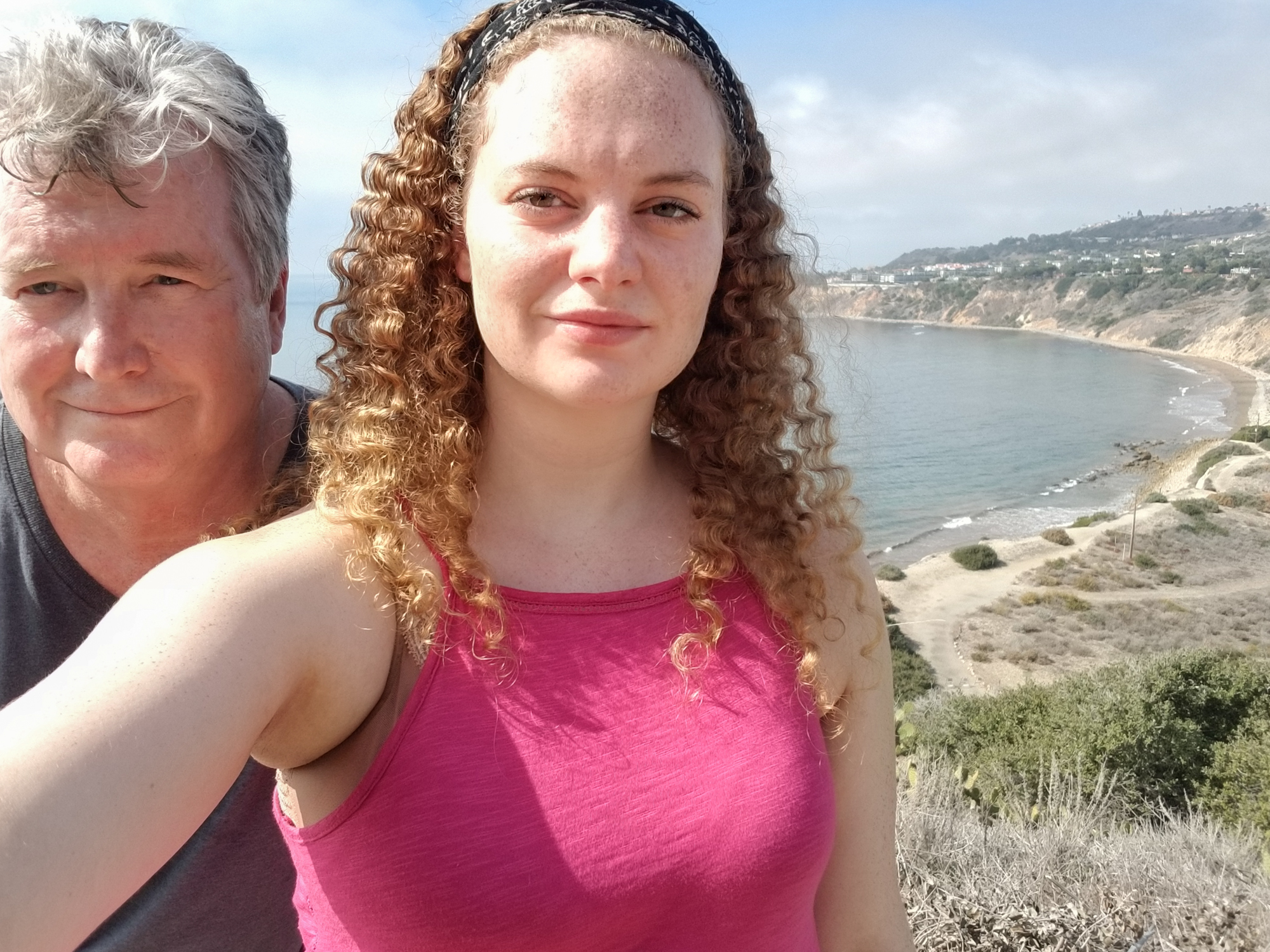
Author Ellen Murray with her father. Photo: Ellen Murray.
Ellen Murray
Ellen is a multidisciplinary artist, PhD student, and, most importantly, a mother of two (cats): Raisin Bran and Apricot.

